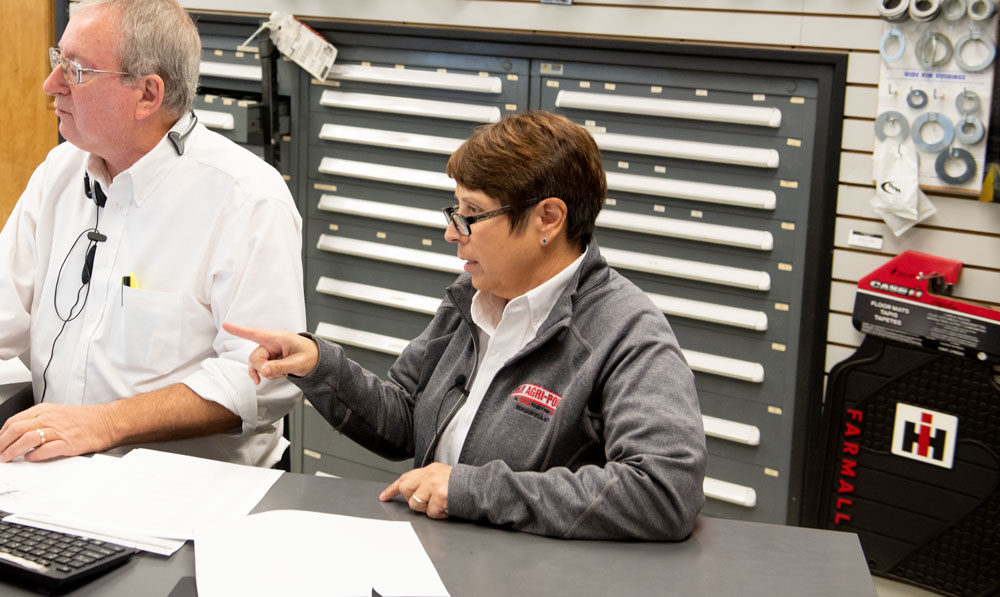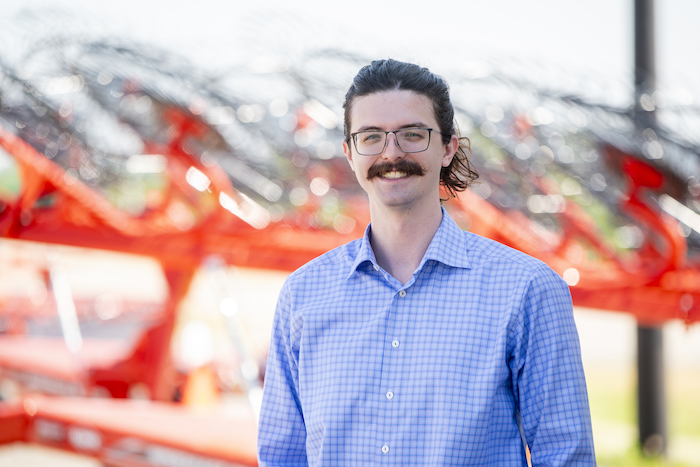Cindy Gough, Corporate Parts Coordinator
Years with Organization: 13
Role: “My title is corporate parts coordinator, but I also function as the parts manager of the Morganfield, Ky., location. I am a facilitator and a coach. My imperative is two things: go into stores and make sure that each parts department understands the metrics that we measure and work with them to embody the customer service culture that we want.”
Cindy Gough’s leadership of H&R Agri-Power’s parts departments is based on relationships. It’s evident as soon as she steps behind the counter: heads turn and smile at her as she greets everyone, usually coupled with some gentle teasing. It’s these relationships, as well as her relationships with her customers and manufacturer reps, says Gough, that allow her to succeed.
Having worked with H&R Agri-Power since 2006, Gough is responsible for managing 17 different parts departments across 6 different states, coordinating the efforts of 16 parts managers that oversee 49 employees. She works out of the Morganfield, Ky., location, where she also functions as the parts manager.
Gough comes from an ag background, having grown up on her parents’ farm, and she credits it with preparing her for the workforce. Throughout her childhood, Gough used to work with farm machinery on a daily basis, setting her up with an intimate knowledge of not only the different types of farm machinery but of how they all function.
The Multiple Tiers of Helping Parts Customers
H&R Agri-Power Corporate Parts Coordinator Cindy Gough doesn’t take “no” for an answer. She describes her process for finding parts like a target. Gough and her parts department are the bullseye and the first contact point for finding a part; if she can’t find it there, Gough moves down the list of her other sources, moving outward from the center until she gets the customer what they need.
Characteristics like accountability, responsibility and a strong work ethic came from her days on the farm, she says. But more than that, Gough says it was her ability to be resourceful and come up with solutions fast on the farm that helps her the most in the world of parts.
“Working on the farm, you had to come up with different options,” says Gough. “Saying ‘no’ wasn’t really an answer. I think that’s a really important skillset to have at the parts counter. You can get a lot of grace with a customer if they know that you are putting forth your best effort to get them a solution.”
Relationships with Customers & Employees
In a department based heavily on repeated face-to-face interaction, Gough places high value on relationships with her customers and aims for her employees to curate their own personal relationships with each returning client.
“We’re packing oil and parts into the customer’s cars, and we’re visiting with them as we walk out the door to see what we can do to help, just to plant seeds for that relationship,” she says. Gough likes to keep in mind that the dealership is owned by farmers, meaning the parts departments need to help every customer as their owners would want to be helped (See “Connecting On-Farm Experience with Customer Engagement” Click here).
How a Good OEM Relationship can Save Your Customers Money
H&R Agri-Power Corporate Parts Coordinator Cindy Gough is big on having good standings with OEMs, especially for the resources it provides. One example comes as Gough remembers a sale that was created by saving a customer from having to replace a gearbox.
“The customer came in, they had a catastrophic failure on a gearbox,” says Gough. “The complete gearbox would cost almost $9,000 from the manufacturer to replace, meaning it was a better investment to repair it.””
“The customer had first taken the gearbox to a different repair shop, and they weren’t able to procure this one shaft that the gearbox needed. The manufacturer didn’t have it, and the other repair shop couldn’t find it. So I get on the phone, I call the manufacturer and I get a good parts team there. We start looking at their sales history, where the last 3-4 dealerships are that they sold this shaft to.”
“Typically, it’s only bought for repair, but he gives me 3 phone numbers and I start calling. One of the 3 dealerships had it and was willing to sell it to me. So I was a superhero, where a second ago nobody could get that shaft.”
She looks for more than just kindness in her employees, however. Gough puts a lot of stock in teamwork and a willingness to take on any job that comes along. “They need to be the kind of employee that, if I’m lifting something heavy, they’re going to lift it up with me,” says Gough.
And that’s not a hypothetical. It’s not uncommon for Gough to move parts herself, as evidenced by her skill with a forklift. She believes the time she spent as a college-aged employee at a parts counter helps her manage better, because she can relate to the work being done. Gough began working in the parts department at Voss Farm Equipment in Marion, Ky., in 1988 and has been in the ag industry ever since.
“I’ve done every task in the parts department, from breaking down the cardboard boxes and building hydraulic hoses to hopping on the fork truck to load,” says Gough. “There’s probably not going to be a task that I’m asking them to do that I haven’t already faced, so I can relate very well to what I’m asking them to do.”
Gough’s personal approach to helping customers is a multi-tiered process, where her relationships form additional layers of tools for her to use to help her clients. She compares it to a target, where the parts employee is the bullseye.
“You’re the first point of contact for that part. In the ideal situation, I would have that part in stock,” says Gough. “But if I don’t have it, then we have layers where we provide service for our customers. The next layer is going to be my circle of our complex stores, my sister stores. Do they have the part? Can I catch it on one of our courier trucks?”
“They say a salesperson will sell a piece of equipment the first time, but it’s parts and service that keep the customer coming back to the dealership…”
The next circle after that is to contact the OEM; if they don’t have it, then Gough goes to the dealer locator on the OEM’s website. From there, the circles expand outward until Gough finds the part or decides that more drastic measures have to be taken.
“Maybe I need to cannibalize a machine. We’re not going to leave any option off the table,” she says.
Optimizing & Streamlining
Tracking metrics in a parts department is a large portion of how Gough measures success. In the parts departments, she aims for a parts and service absorption rate around 85% or higher. For parts profit margins, Gough says all the H&R Agri-Power parts departments aim to grow gross margin dollars year-over-year. Stores that come in short of that number are the ones Gough and the corporate team will take a closer look at, to discover where the shortcomings are and how to address them.
Gough is particularly focused on how the dealership handles returning parts to OEMs. H&R’s asset manager, Patrick Baldwin, has the specific task of updating a shared spreadsheet for all parts department managers which tracks the part turnover rates and reveals what parts are underperforming. Every month, parts deemed inactive or obsolete get a critical analysis on their value to the dealership, including how many machines that use it are in the dealership’s AOR. Truly inactive parts get returned and new parts are bought with a goal of turning them 2.5-3 times or more.
Gough’s relationship with her OEMs helps her out in other areas, like when it comes to nonreturnable parts. Having an exit strategy is crucial, Gough says, to avoid putting extra energy into marketing a part that could have easily been returned in the appropriate time frame.

Cindy Gough, corporate parts coordinator for H&R Agri-Power, measures her parts obsolescence and inactivity every month, which is tracked in a spreadsheet.
“It’s in the relationship with the OEM, because there’s a certain point where those parts are going to be 100% nonreturnable to the OEM,” says Gough. “There’s a delicate balance. We’ve found it critical to manage those parts with our OEMs. You look at that part and ask: Is there an opportunity to market this to a customer that still owns this piece of machinery?”
Gough calls the parts department the “heartbeat of the dealership,” what keeps customers coming back.
“They say a salesperson will sell a piece of equipment the first time, but it’s parts and service that keep the customer coming back to the dealership,” says Gough. “In the parts department, you see all aspects of the dealership from that counter. You’re going to see that customer as they walk through the door, make that initial contact and help them find what they need.”
Looking Ahead to 2020
Forward and backward momentum are the only two kinds of movement in a dealership. Gough says this while describing what her ideal dealership would look like, what changes she would make. Ultimately, she concludes that reaching for the goal of a perfect department is the key, not the perfection itself.
“Maybe the parts department is not what you want it to be this year, but you’re still going to work on it every day,” she says. “There’s no such thing as a static existence in our industry. If you’re not trying to move forward, you’re probably going backward.”
Gough’s hands-on approach is a strength when it comes to the day-to-day of being in the parts department. Her direct, boots-on-the-ground style of management has its benefits, like understanding the subtle intricacies that set each parts department apart and how to diplomatically handle their issues.
Looking ahead, Gough aims to bump up H&R Agri-Power’s efforts on staff training and increase their speed on turning new hires into capable employees. Gough admits that it takes about a year for an employee to fully understand the business.
“You have to go through all the seasons of a farm and see all the equipment through all those seasons from behind the counter,” she says.
Gough sets the standard high in her department, not only for her team but also for herself. She only asks of her employees what she does herself: keep moving, be willing to help out and do whatever it takes get the customer what they need.
Dealership Minds 2020 Overview: H&R Agri-Power
Dealership Minds: Leading the Charge
Dealership Minds: Sage Wisdom from A Dealership Lifer
Dealership Minds: Building H&R Agri-Power’s Culture, Profitability
Dealership Minds: CFO: ‘Conducting’ the Orchestra
Dealership Minds: Measuring Sales Success Through Customer Satisfaction
Dealership Minds: Creating a Reputation that Sells Equipment
Dealership Minds: Connecting On-Farm Experience with Customer Engagement
Dealership Minds: Managing the Measurables of a Precision Business
Dealership Minds: Financing Solutions to Keep Sales Selling
Dealership Minds: Coaching the Sales Team to Dealership-Wide Success
Dealership Minds: Maintaining High Standards of Service
Dealership Minds: Following the Data & Managing Relationships to Order Equipment Properly
Dealership Minds: Leading by Example in the Parts Department









